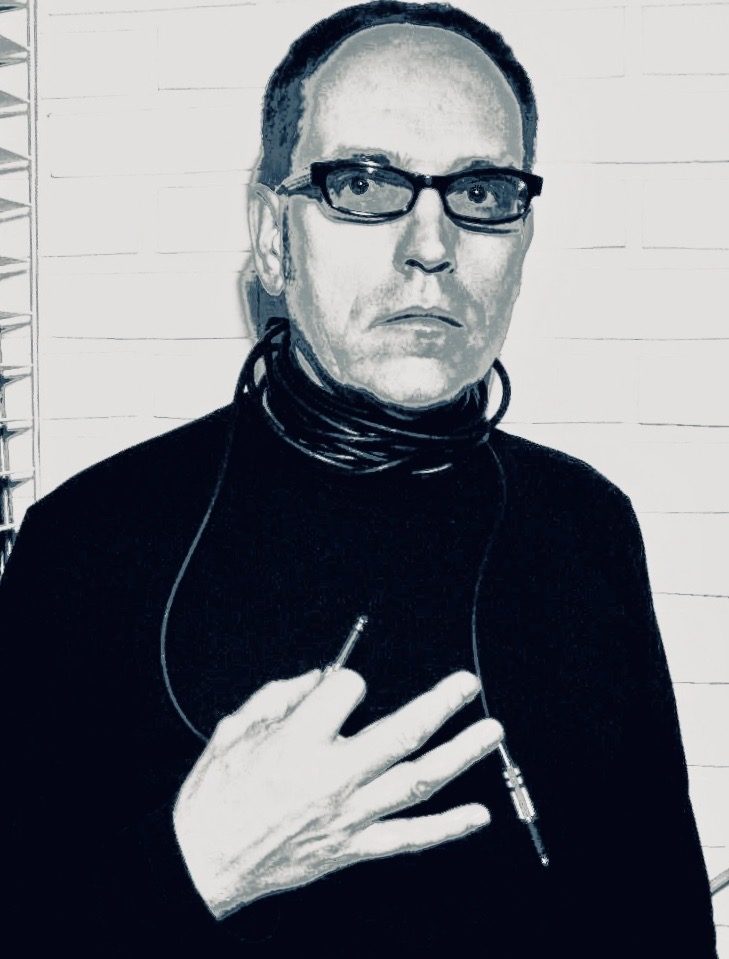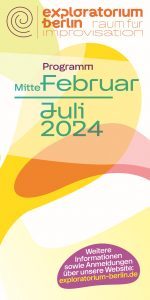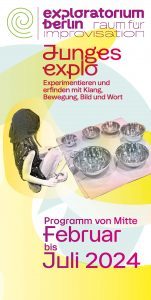
Dezember 2022
imp[or]trait #9: Alfred 23 Harth – “Life Can Be A Gestalt In Time”
Zeit/Time
27. Dezember 2022 9:19 - 9:19
Ort/Location
exploratorium berlin, hall
Inhalt/Content
Talk in German Guest: Alfred 23 Harth Moderation: Mathias Maschat The Neue Zeitung für Musik called him one of the “most prominent jazz avant-gardists in West Germany”; the Portuguese blog Jazz e
Inhalt/Content
Talk in German
Guest: Alfred 23 Harth
Moderation: Mathias Maschat
The Neue Zeitung für Musik called him one of the “most prominent jazz avant-gardists in West Germany”; the Portuguese blog Jazz e Arredores even called him one of “Germany’s best-kept secrets of the last 40 years”. If the latter is true, it would be time to unravel some of the mysteries.
A guest in the talk series imp[or]trait is the multi-instrumentalist, composer and multimedia artist Alfred 23 Harth – all-round talent and iconic figure in the development of free music in Germany. The initial idea is the bon mot “life can be a gestalt in time” by the founder of humanistic psychology, Abraham Maslow, which Harth already cited in 1981 on the Goebbels/Harth album Der Durchdrungene Mensch – Zyklus Über Den Modernen Mensch. In a talk with Mathias Maschat, Harth takes a look at his life between music, fine arts and poetry, between political agitation, happenings and organisation, taking politics, society and aesthetics into account: at his life as a Gestalt unfolding over time, as one coherent whole.
Born in Taunus in 1949, Harth grew up in Frankfurt am Main. In 1967 he founded the free improvisation group Just Music, whose record appeared in 1969 as the second release ever on ECM and with which he collaborated in 1970 with members of the Chicago AACM. Also in 1967, Harth opened the centrum freier cunst in Frankfurt for improvised live music, art exhibitions and experimental poetry. The list of his famous and style-defining collaborators is endless and speaks volumes. It begins with Sven-Åke Johansson and Rüdiger Carl, with whom he played at the legendary Zodiak Free Arts Lab in Berlin in 1968. From 1970 he lived with the Belgian artist and pianist Nicole Van den Plas in Belgium, where a fruitful free jazz scene had developed in Bruges and Antwerp, and gave concerts there with her, Paul Lovens and Peter Kowald. In 1972 he founded the group E.M.T. (Energy/Movement/Total) with Van den Plas and Sven-Åke Johansson. During this time, Harth was also part of Gunter Hampel’s Galaxie Dreamband and made his first connections to the New York scene, namely Perry Robinson, John Fischer, Jay Clayton and the Brubeck sons, with whom he worked in the New York loft scene in the mid-1970s.
Back in Frankfurt, Harth founded the Duo Goebbels/Harth (1975–1988) with the composer and music theater director Heiner Goebbels, which became known, among other things, for its arrangements of Eisler and Bach. From 1976 to 1981, Harth and Goebbels belonged to the core of the Sogenannte Linksradikales Blasorchester, a large formation that provided musical accompaniment to events in Frankfurt’s political left wing scene. Joachim-Ernst Berendt described the second Goebbels/Harth LP Vom Sprengen des Gartens (1979) as the most important German jazz recording of the 1970s, and together with Goebbels/Harth he produced the jazz & lyric LP Zeit wird knapp with lyrics by Bertolt Brecht in 1981 . At the same time Harth began to integrate extended media such as tape loops, field recordings and objets trouvés into his music, composed his first theater music and exhibited his artistic work in Frankfurt.
With the aim of bringing punk, jazz and contemporary music together, Alfred Harth initiated the LP Es herrscht Uhu im Land in 1980 with the help of his contact with ECM/JAPO and hired Heiner Goebbels, Christoph Anders, Paul Lovens, Rolf Riehm and Annemarie Roelofs for this. This goal was further pursued in the group co-founded by Harth Cassiber, which also included Heiner Goebbels, Chris Cutler and Christoph Anders; they can be viewed as a West German parallel development to the New York downtown scene and as such were extremely influential and style-defining. In 1983 Harth initiated the Duck & Cover project group with Tom Cora, Chris Cutler, Fred Frith, Heiner Goebbels, Dagmar Krause and George Lewis. For his ECM record This Earth! and further concerts he played with Paul Bley, Barre Phillips, Maggie Nicols and Trilok Gurtu. In 1984 he founded the postmodernist group Gestalt et Jive with Steve Beresford, Peter Hollinger and others.
Harth began incorporating samplers, performances, and videos into his music; the record Anything Goes (1986) was his first remix work. He also played in a duo with John Zorn and in a trio with Peter Brötzmann and Sonny Sharrock. He was a member of Lindsay Cooper’s group Oh Moscow. In 1988 he founded the group Vladimir Estragon with FM Einheit, Ulrike Haage and Phil Minton.
In 2000 Harth founded the trio Viriditas with Wilber Morris and Kevin Norton in New York and was a fellow at the Ssamzie Space in Seoul in 2001–2002. He shifted the focus of his work to East Asia, played concerts with Kang Tae Hwan, Choi Sun Bae, Park Chang Soo and many others. Since then, his futher musical partners have included Kazuhisa Uchihashi and Otomo Yoshihide, in whose ensembles he was a permanent member.
With Günter Müller, Hans Joachim Irmler (Faust) and Wolfgang Seidel (Ton Steine Scherben), he conceived the quartet Taste Tribes, with which he will be performing at ausland on March 4, 2023: https://ausland-berlin.de/agnellanzvatcher-taste-tribes
In cooperation with biegungen im ausland
Recording: https://www.youtube.com/watch?v=g-5p72Tltuk

